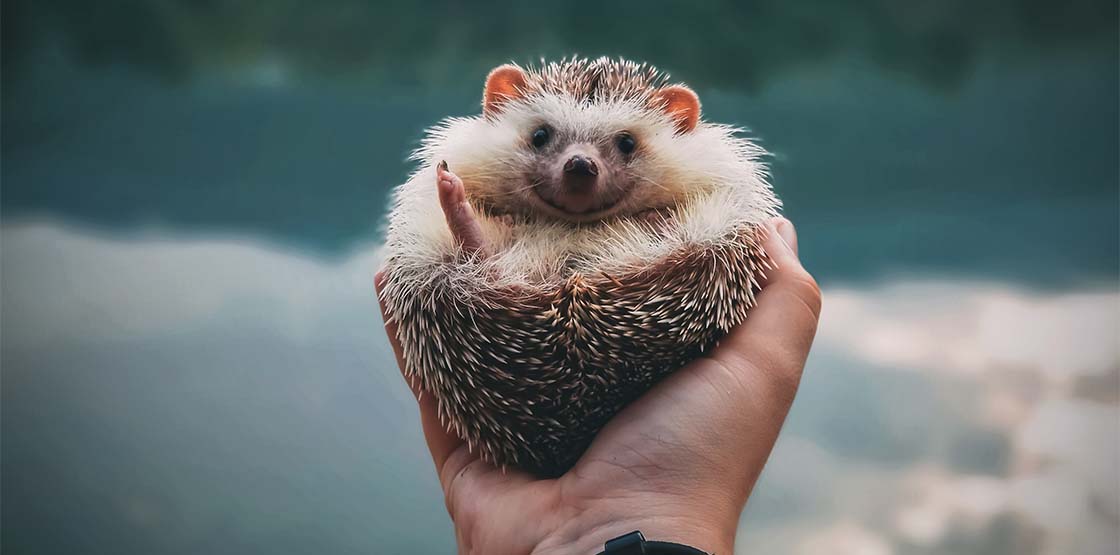Are Hedgehogs a Good Pet?
The species of hedgehog most commonly raised for the pet trade is the African pygmy. They originally came from Africa, where their natural habitat was the savanna and grassy areas. So, if these animals are from the wild, are hedgehogs a good pet?
The trademark spines that cover the hedgehogs back provide them with protection from predators. Hedgehogs cannot shoot their quills out in defence in the way a porcupine would, but instead, they twitch and jump around so that their quills poke into the skin until they are released. If threatened, the hedgehog rolls their body into a tight little ball that protects their faces and limbs. They have incredibly strong muscles across their backs, which means that it is virtually impossible to uncurl them without causing them harm.
These little guys measure 5 inches to 8 inches in length and have an average lifespan of about five years.
Hedgehogs as Household Pets
There are growing numbers of hedgehogs being kept as pets but do be aware that they have special requirements that need to be met. This means that research is essential before one joins your home.
Although they may look a little on the rotund side, hedgehogs are actually quite athletic creatures. In the wild, they run several miles a night and despite their short, little legs, they are excellent climbers and swimmers. This all means that they need a large enclosure to enable them to get enough exercise to stay fit and healthy; a rodent cage is not going to be suitable for their needs unless you attach a run area so that they can really stretch their legs. Do avoid enclosures that have wire mesh bottoms as a hedgehog’s small feet can easily become injured if they fall through the grates.
Hedgehogs can also be quite shy creatures until they get to know you, so they will also need a hiding spot to retreat to and use as a sleeping area. Don’t forget that sleeping will take place during the day as hedgehogs are nocturnal. That means you may not want to have the enclosure near your bedroom, where you will be kept awake by their night-time activity.
Coming from the warmth of Africa, you will also need to provide an external heat source such as an under-tank heater or heat bulb and aim for a constant temperature of between 75F to 85F. Hedgehogs can go into what is called a state of torpor when it becomes too hot or cold. This results in slower breathing and heart rates, along with violent shaking and muscle contraction when conditions return to their preferred temperature range.
Hedgehogs are insectivores, though, in the wild, they eat a range of food, including snails, bird eggs, grass roots and berries. Commercially available foods will ensure that your hedgehog gets all the nutrients they need, but they will also love an occasional treat of mealworms or crickets, along with a variety of fruits and vegetables. Fresh, clean water should always be available. The old wives’ tale of feeding hedgehogs’ bread and milk should not be followed. Hedgehogs are lactose intolerant, so that means that milk can give them upset stomachs, and there is little goodness or energy they can get from eating bread.
You May Also Like:
Related Search Topics (Ads):
Pros of Having a Hedgehog as a Pet
With lots of careful and gentle handling, you and your hedgehog will bond. They’ll begin to recognize you and will come running across to see what goodies you’ve got for them.
Another great thing is that hedgehogs are clean little animals; they do not produce any allergens in the way that furry pets can, and when their living areas are cleaned daily, there is very little odor from keeping them in the home.
These guys love exploring! Adding in new objects for them to climb over, under and through will provide you with hours of fun as you watch them investigate their new surroundings.
Cons of Having a Hedgehog as a Pet
Hedgehogs have an interesting response to new scents; they lick and bite it and then produce a frothy spit ball, which contains the new smell. Then, they throw their heads back and cover their spines with the saliva. It’s thought that they do this to camouflage themselves and make themselves less obvious to predators. While its completely normal hedgehog behavior, it is still a little gross!
Unfortunately, hedgehogs can carry several diseases that can be passed on to humans. They do carry salmonella bacteria in their stools, so careful disposal is needed along with thorough cleaning of hands after cleaning up their enclosure. They can also carry fungal spores on their quills and skin, which can create health problems for the hedgehog and can cause ringworm in people.
Keeping a hedgehog is illegal or restricted in some states including, California, Georgia, Hawaii, New York City, Omaha, Nebraska and Washington, D.C. In other states and cities, you may need a permit to own one.
In Review
An African Pygmy hedgehog can be a cute pet who provides hours of entertainment with their antics. However, they need a knowledgeable owner who will ensure that all of their needs are met

